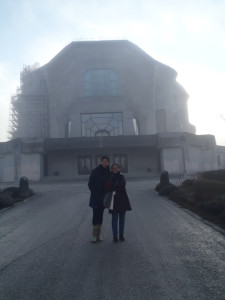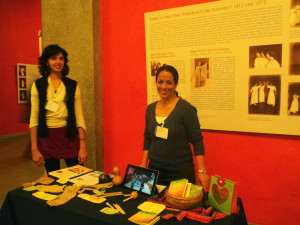Escuela Caracol is Represented at an International Conference in the Goetheanum
During Easter Week, the international pedagogical conference “Transitions: from Birth to Age 14” was held at the Goetheanum in Dornach, Switzerland. The Goetheanum is the centre of the worldwide network of followers of Rudolf Steiner’s philosophy. People working in education, architecture, medicine, agriculture, music, arts and sciences come together to further develop their work in relation to spiritual science.
The original Goetheanum was made of wood and designed by Steiner using organic architecture, linking each part of the structure with the whole, thereby representing the continuous process of metamorphosis. This structure was destroyed by arson in 1922. Steiner designed the second Goetheanum whose construction began in 1925. He died the same year but left indications for its construction. His remains are buried in the garden. The Goetheanum is a strikingly unique building and visiting it is an unforgettable experience.
It is not only in the Goetheanum where one can witness these architectural characteristics, as other buildings around Dornach also have distinct features. Houses, shops and other buildings are influenced by Steiner’s principles, most notably is the departure from the right-angle as a basis for a building plan. (http://www.goetheanum.org/ )
Our teachers from the Primary School, Karin and Andrea, were overjoyed with the opportunity to attend this conference. They were hosted by a Waldorf gardening teacher and his partner who works at the Goetheanum. It also goes without saying that this would not have been possible without the financial support from the Goetheanum, and in Andrea’s case, two private donors. Having travelled a long way from Guatemala, everybody at the Goetheanum welcomed and supported Escuela Caracol’s endeavours.
Arrangements were made to set up a table showcasing student work and sharing information about our school and our community. We were one of only four projects permitted to host a table. This generated a lot of attention and helped form some important bonds with other teachers and schools. People were generous and helped with small donations which will go a long way here in Guatemala. In addition, an exclusive time was set aside for the screening of our documentary.
Attending a pedagogical conference such as this one is a tremendous learning opportunity for any Waldorf teacher. It’s an honour to sit in on lectures from people whose books you have read, such as Michaela Glőckler. It is inspiring to hear from experienced teachers and anthroposophists who have been studying and working with these ideas for decades. It is truly moving to meet teachers from around the world, from different cultures and contexts, yet with a common language: love for the child and a belief for a world that can evolve. Over 600 attendees represented five continents and more than 40 countries, such as Nepal, Zimbabwe, New Zealand, Moldova and Chile. They counted on simultaneous translations in six languages. These are opportunities of a lifetime, allowing us as educators to connect with a global community and reminding us that as educators, we carry a greater question about the development of future generations. We are supported to do this work in the world because we are not alone. Yet it is up to each individual to tune into that inner impulse and develop ourselves first as human beings.
Upon their return, Karin and Andrea shared their experience and what they learned with their fellow colleagues. Their presence at the conference represented Escuela Caracol and everybody who supports us.
VIELEN DANK!
Lectures/workshops attended include:
- “Transitions in Childhood: A Medical View of Crises and their Consequences in Later Life”
- “Metamorphoses in the Development of the I from Birth to Age Fourteen”
- “Together in the Stream of Life: Metamorphoses in the Adult’s Inner Attitude in Relation to the Child”
- “The Shape of Space and Time in Childhood: Building Bridges for Development into the Future”
- “Abstract Transitions: The Teaching of Mathematics”
- “Creative Movement”
- “Religious Education and Multiculturalism in Various Ages in Life”
- “Birth: The Never-ending Transition”
- “Schooling Observation in Order to Accompany Transitions”
- “Waldorf Education in East Africa”
- “Prevention of Addiction in Kindergarten and School”
- “Working Hours, Salaries, Pedagogical Meetings: Challenges and New Approaches for Working Together”


